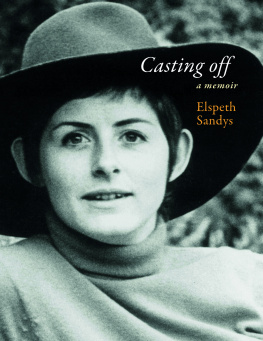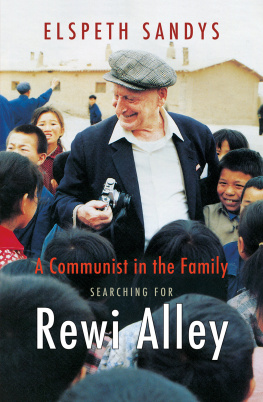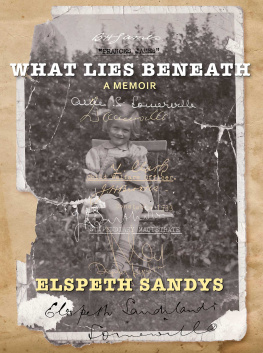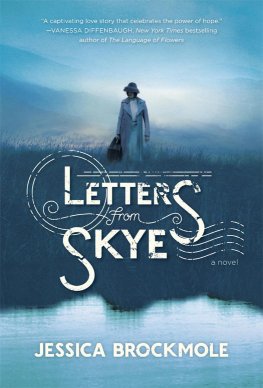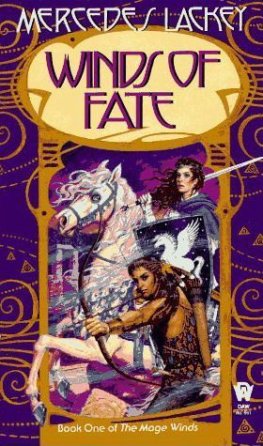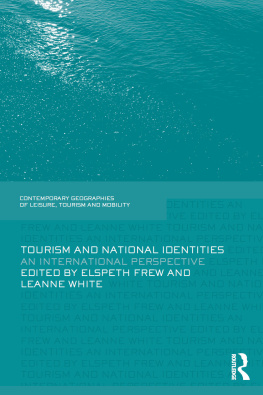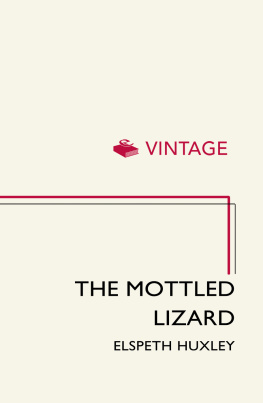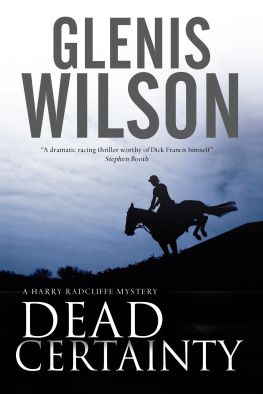


For my friends
First published 2017
Copyright Elspeth Sandys
The moral rights of the author have been asserted.
ISBN 978-0-947522-55-1 (print)
ISBN 978-1-98-859283-1 (epub)
ISBN 978-1-98-859284-8 (Kindle mobi)
ISBN 978-1-98-859285-5 (ePDF)
A catalogue record for this book is available from the National Library of New Zealand. This book is copyright. Except for the purpose of fair review, no part may be stored or transmitted in any form or by any means, electronic or mechanical, including recording or storage in any information retrieval system, without permission in writing from the publishers. No reproduction may be made, whether by photocopying or by any other means, unless a licence has been obtained from the publisher.
Editor: Jane Parkin
Ebook conversion 2020 by meBooks
Acknowledgements
My warm thanks to the Michael King Writers Centre, and to Ka Meecham and Tania Stewart, for the two-month residency which enabled me to write this book.
I would also like to thank Rachel Scott for her loyalty and wise counsel, Gwynnedd Somerville for her loving involvement, and my friend Carole Angier for everything.
Authors Note
This is an incomplete memoir. Out of respect for people close to me I have left large gaps. If anything in the book causes distress or gives offence, I am truly sorry. I make no claim for what I have written to be seen as The Truth. It is my truth, that is all.
They change their sky, not their soul, who rush across the sea
What you seek is here.
Caelum non animum mutant qui trans mare currunt.
The Odes of Horace
Contents
T he name I answer to in 1956 is not my true name. Lets just say Im the bad news my parents never wanted to hear.
Im sixteen. Horrible age. Im mutating, like a species of fish, from childhood to adulthood, an identity I have already adopted in a number of no doubt suspect ways. Three different homes and three different families my adoptive father died when I was fourteen; my adoptive mother has been intermittently confined to mental hospital have something to do with that. As has reading, anything and everything I can lay my hands on. My current craze is Graham Greene. The End of the Affair will haunt me through decades as turbulent as those Greene himself lived through. So, for different reasons, will Thackerays Vanity Fair, Hardys Tess of the dUrbervilles, George Eliots Middlemarch, and the shocking and sometimes silly novels of D.H. Lawrence. So far, post childhood, Ive blasted my way through half a dozen Dickens novels, a fair dollop of Trollope, all of Hardy, The Cruel Sea (page 99 learned by heart), For Whom the Bell Tolls, The Great Gatsby, most of Forster and Eliot, and Moby Dick, not to mention a pre-teen passion for the novels of Georgette Heyer and an obsession with Shakespeare.
With so many different adult voices competing for attention in my head, is it any wonder Ive become an expert in pretending I know what Im talking about?
Im sitting in the living room of my current home listening to the news on the radio. The announcer is talking about the possibility of a third world war. 1956 will go down in history as The Year of the Suez Crisis. Or, if you want the official designation, The Year of the Tripartite (Britain, France and Israel, sitting in the naughty chairs) Aggression. The family Im living with mother, father, two daughters are all in the room with me. The atmosphere is solemn.
Im utterly convinced that the action we have taken is the right one, the British prime minister, Anthony Eden, is saying. The mother of the family nods; the father frowns; the daughters one the same age as me, the other two years younger fiddle and look bored.
Im fiddling too, but out of excitement not boredom. My fiddling always takes the same form. I spell out words on the back of my hand. I cant remember what words I spelt out as I listened to the honeyed voice of Great Britains prime minister, but Im sure they had something to do with my belief that the British well, the English always did the Right Thing. Staring up at me from the discarded newspaper on the floor is a photo of Anthony Eden at the door of Number 10. Hes handsome. I picture him standing up to the Nazis, resisting their terrible tortures, embodying the spirit that won the war. Today hes talking about a new enemy, an Egyptian called Gamal Abdel Nasser, who has seized the Suez Canal from its rightful owners, the British. I feel indignation, outrage, anger. I have no doubt the military action my hero has taken is justified both morally and legally.
Is there going to be war? the younger of the sisters asks.
Hush, the mother answers. Listen.
Is there, Daddy?
Lets hope not, darling.
Over the next few days as my Romantic Toryism (not a phrase I would have used in 1956) comes under fire from those who think differently, I grapple with emotions that have no fixed point of reference but are nevertheless invested with a power I can neither escape nor fully comprehend. The father of the family Im living with isnt happy with Mr Edens handling of the crisis. Neither are a lot of other people, including the American president. Mr Eden is married to a niece of Winston Churchill. Surely this guarantees his good faith? When he resigns two months after this first broadcast, anguish tears at my heart. In the photo printed in that mornings paper he looks like a man who has had all his fingernails pulled out. The report mentions, among other things, that at the height of the crisis he didnt sleep for three nights in a row.
How will he live now? What will become of him?
(Reading this passage some weeks later Im suddenly gripped by doubt. Did this event happen in this way, in this place? Another image is shadowing that living room, those people, those words. Im back in my legal home, sitting by the window of the room we called the breakfast room though no one ever ate breakfast there and Im listening to that exact same broadcast while my mother hovers threateningly in the background. Which memory is true? The one I have just described, or its shadow? Jenny Diski, in her brave and brilliant farewell to the world, In Gratitude, declared memoir to be a form that plays hide and seek with the truth. It contains what I imagine and what I remember being told. So maybe neither memory is true. But what has clung to that occluded event, what I feel now when I think back, that is true.)

My Romantic Toryism persisted through my teens but with decreasing intensity. By the time I was twenty it had given way to more robust beliefs. But the tendency to see the best in people and in the causes I supported to romanticise, in other words remained, opening me up to the criticism (both then and now) of being nave and other-worldly. But I never quite gave up my sympathy with the handsome prime minister (and his beautiful Churchillian wife) who so nearly took us into a third world war. Eden lived for another twenty years in what might be described as privileged obscurity. But that doesnt answer the questions I asked as an anguished sixteen-year-old. How
Next page
